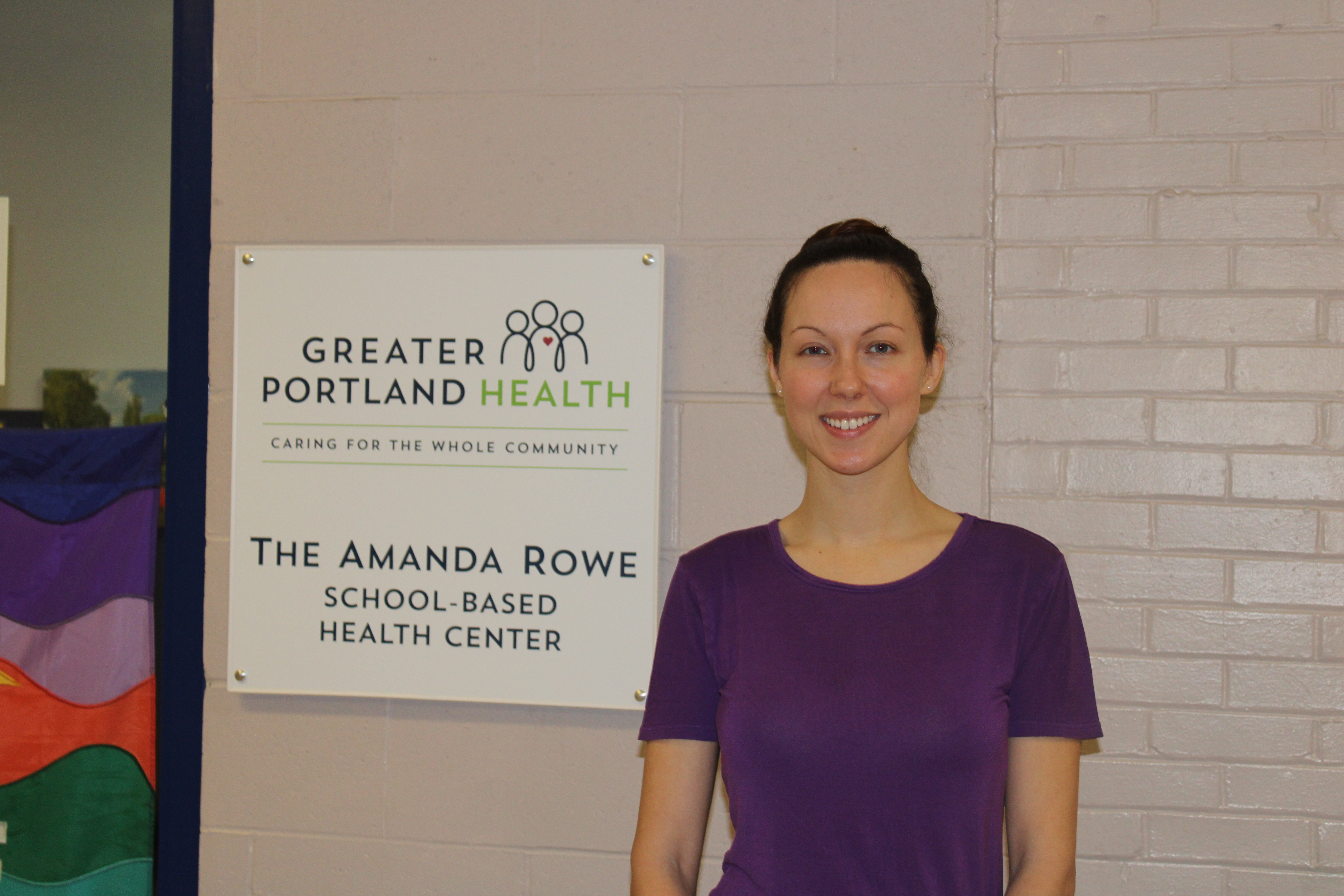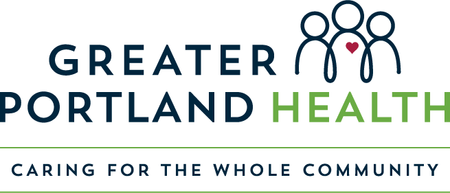
Chelsea Toussaint, DMD
February is National Children’s Dental Health Month; this observance’s goal is to help showcase the positive effects that managing good oral health can have for children. Earlier this month we talked to Chelsea Toussaint, who’s a board-certified dentist for Greater Portland Health’s Children’s Oral Health Program and Preble Street. She spoke about her career path to becoming a dentist, some of the services that the Children’s Oral Health Program (and Preble Street) offers, as well as the benefits children taking care of their teeth can provide.
1. Hi Chelsea! You work as a dentist for Greater Portland Health's Children's Oral Health Program & Preble Street. What led you to want to become a dentist, and how did you end up at Greater Portland Health?
So, I originally became a dental hygienist in 2008. I’m from Northern Maine – I'm from a very Undeserved area. There's not a lot of access to healthcare or dental care, so I became a hygienist, and I moved right back home to Madawaska. I worked in Fort Kent and Madawaska for a year. During that year, I saw a lot of other things that the patients needed, so I wanted to help them with [these] things, and I wanted to be able to do more. At the same time, UNE had announced that they were opening a College of Dental Medicine, so everything just lined up.
I wanted to come back and get more school to become a dentist so I could move back into either an Underserved area or help Underserved populations with the needs that they have. What led me here to Greater Portland Health after I became a dentist – I just like the ocean, and I like Portland a lot, so I had a hard time moving back up home, but I came into public health because it was something that I was always interested in.
I wanted to make my personal impact – a positive impact for [the Underserved] population. I also find it very rewarding to work with that population because you learn a lot about different cultures, and people appreciate what we do so much; every day is rewarding when I come home. It's just very fulfilling. It's a very fulfilling career, and I enjoy helping the people who need it most. I used to volunteer as well with Health Care for the Homeless before it was Greater Portland Health, so while I was getting ready for dental school. I did touch down a little bit with this company before, so that's why I wanted to eventually come back [to GPH], and this field of work.
2. What are some of the services you conduct as a dentist with Greater Portland Health? What are some of the services our [Children's Oral Health] Program offers as whole?
[For our] dental program when a patient first comes through the door they are seen for a comprehensive exam. Normally, if they have no pain or anything, and they're good, and they'd like to know what's going on we see everything – we look at everything. We see early issues and conditions that are very easy to treat. We see preventable conditions, so we're able to help them on those fronts. We also can diagnose and discover more advanced conditions that may need urgent care and attention, and we're able to help these patients find where they need to go to get that treatment that they need.
So, our aim is to really help them on all stages – from emergent care to prevention, which is a really big thing for us. A lot of the patients are not from our country, and they've just arrived here. We're able to see them as they're a new resident of the U.S., and we want to tell them about the diet here, and how the diet here might be different from the diet that they had, and what dental problems can arise from the diet and the lifestyles sometimes that they could lead in the U.S. We're trying to hit them on the front lines and prevent all of these conditions before they become more serious; we want to work holistically to improve their oral health because it’s connected to their general health as well.
Specific [services] that we do offer: If they need fillings or teeth to be removed we can do that. If there's more advanced things that are needed on the teeth we can refer to the specialist that are needed for those services as well, and then we see them again and we do the regular exams – the comprehensive care just to keep them healthy for a long time throughout their whole life.
3. How does this compare to working as a dentist for Preble Street? Are the services we offer similar?
At Preble Street we see an adult population, and at the Children's Oral Health Program in school we see the kids, so naturally there are a little bit more emergent needs at Preble Street. The lifestyles that people are leading are a little bit less predictable and stable, possibly, so dental care is a little bit more difficult for them. Once we see them for that initial visit they may have not known that we're there and they come in, in pain. What I like to do is, of course we'll deal with the issue that they'd like to be taken care of, but I also let them know 'We can see these other early things, so I'd love for you to come back because before it gets to be like that and painful we can easily fix these other things for you – doesn't that sound easy? Pretty good right?'
[The patients] are very happy that we're there and they're now aware – [it's] a dental home for them. So, I like to have them be as comfortable as possible walking in. That is the number one most important thing for me – is to allow the patient to really have a comfortable and productive relationship with a dentist so they can have that oral health that maybe they didn't have in the years past. So, the two sites are very different, but it always comes back to prevention and the early care – trying to prevent these other issues from happening. So, I think establishing a positive relationship with a patient is the upmost importance to get them to come back and have a regular relationship with us as well.
4. Speaking as a dentist – Why is it important for children to take care of their teeth from an early age but also when they get into adulthood?
It's important to establish the habits when you're young. With baby teeth, even though [they] fall out, it's a misunderstanding that since they're falling out and you get new teeth that they're not important; they're so important in the development of the jaw, in the maintenance of space for the adult teeth, and the nutrition in early life and speech – everything is affected by the teeth really and the way that we live our lives, so they're very central in somebody's life.
It's a very important thing. So, to teach [our patients] about prevention will help them to avoid having dental diseases that require treatment. That is always the best for the dental health throughout someone's life – to have natural teeth remain full and not needing to be restored. That would allow the patient's function to be the best, their nutrition throughout life to be the best, and then that way when they're young we can also educate them on what they need to do throughout their whole life to keep caring for those adult teeth.
We do loose our baby teeth but they're a good practice for really knowing how to care for those adult teeth and keep them clean and free of disease throughout their entire life. It's a good positive impact not just on their dental health, but they're general health, which is also impacted by their dental health.
5. Are there any final comments that you want to tell our community members about our dental services [at Greater Portland Health]?
Just the fact that we're here is important. So, for people to be able to tell their friends and their family, especially if they have a good experience here; [that] is the number one most important thing for somebody to help their dental future, their dental health, is to come and have a relationship with a dentist and their hygienists who will help clean their teeth. Then we can make sure that we are helping them guide their dental future, and so that it's helpful for them for the rest of their life. A lot of people don't know that they should see the dentist; for little kids, it's that once the parents see their first tooth in the front go see a dentist so that the dentist can help you understand how to best clean the tooth and the best things about nutrition, what to avoid, and what to try to do more of – that's one thing.
The other thing is when people come to the dentist we always just try to make it as fun and as comfortable as possible. We just want to help people – we want people to not have any fear of the dentist and not just to wait until pain happens, because before the pain is when things are a lot easier to fix. So, it's an important thing to just have a relationship with a dentist and know that we're here and we are welcoming new patients all the time, so just come right over to either of our locations at the high school or at 63 Preble Street and come say hello!
To set up a dental appointment for either our Children’s Oral Health Program or Preble Street services please call (207) 874-2141.
